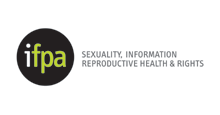11 July 2013
Figures published today (11.07.13) by the UK Department of Health show that in 2012, a total of 3,982 women with Irish addresses accessed abortion services in the UK.
Responding to the figures, the Irish Family Planning Association (IFPA) Chief Executive Niall Behan said: “It is unacceptable that women in Ireland must rely on UK health services to provide access to safe and legal abortion. The ban on lawful abortion services in Ireland does not deter women from having abortions; it places the burden of accessing this necessary health service on women.
“In the last ten years the IFPA has received over 40,000 calls to our national helpline and provided non-directive counselling to more than 12,000 women. Every day we hear from women who have to leave this country to access health services that should be available in Ireland.
“The statistics mask the hardship experienced by women who are denied access to abortion services in Ireland. Women’s reasons for choosing abortion include financial worries, concern about the well-being of other children, diagnosis of serious foetal abnormality, pre-existing health problems, including mental health problems, and relationship issues. The decision to have an abortion is not one that women take lightly.”
In a landmark judgment against the Irish State in 2010, A, B and C v Ireland, the European Court of Human Rights ruled that the constitutional ban on abortion imposes significant psychological, physical and financial burdens on the 4,000 women who are forced to travel each year to access abortion services in the UK.
Mr. Behan said, “No one can be under any illusion that enacting the Protection of Life During Pregnancy Bill fulfils the state’s responsibility to women.
“The legislation permits abortion only when a woman’s life is at risk. The constitutional ban prohibits abortion in all other circumstances, even where there is a serious threat to a woman’s long-term health and well-being. It is clear that the Constitution must be amended.
“We have heard a lot from politicians in recent weeks about compassion for women in crisis pregnancy. Compassion is not enough: the government needs to now shift its focus to reform of the law.
“Our clients don’t want sympathy, they simply want access to the health services they need in their own country.”
ENDS
Notes to Editors
- 2012’s figure of 3,982 represents a drop of just 167 on the previous year – a decline of 4%.
- Women travelling from Ireland constitute 68% of all recorded terminations carried out on non-UK residents.
- Since 1980 at least 156,043 women travelled to Britain for abortion services.
- These numbers are an underestimation as not all women resident in the Republic of Ireland will provide their Irish addresses for reasons of confidentiality and cost. Some Irish women will give addresses in the UK at which they are not resident, in order to obtain abortion care paid for by the NHS.
- In recent years, an increasing number of women attending the IFPA’s post-abortion medical and counselling services indicated that they had terminations in other EU states.
- After a referendum in 1983, Article 40.3.3 of the Constitution was inserted to read: “The State acknowledges the right to life of the unborn and, with due regard to the equal right to life of the mother, guarantees in its laws to respect, and, as far as practicable, by its laws defend and vindicate that right.” The Supreme Court ruled in Attorney General v X that Article 40.3.3 permits abortion in Ireland if a woman’s life is at risk.
The UK Department of Health 2012 statistics are available here:
https://www.gov.uk/government/uploads/system/uploads/attachment_data/file/307650/Abortion_statistics__England_and_Wales.pdf

